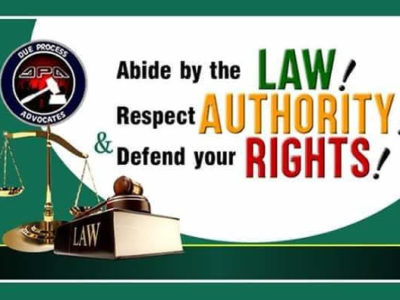Why The Call for Protest for Revolution is a Dangerous Joke
Yes, Nigerian government, this and the ones before it, but particularly this one, have failed Nigerians. The conditions of human life in Nigeria have never been as bad as they are right now. The country is on the verge of another civil war, that is if one fails to admit that war is already ongoing on many fronts. We admit that a radical solution is needed for Nigeria to move forward in any positive direction.
However, to believe that you can call for a protest "to start a revolution" is an exercise in naivete or a plain self-deception. Yes, the people have a right to protest and to express grievances against government. And indeed, such mass expressions of grievances may trigger or spin off into a revolution so to speak. But to declare ahead of time that your protest was for the purpose of initiating a revolution is highly unusual and effectively self-defeating.
Revolutions are hardly ever planned on any specific date, otherwise any such plan will be treasonable at the outset. Regardless of what normally happens when and if a revolution has succeeded, the focus now is on what happens to a revolution that has not succeeded or which is just at the stage of social media declaration. The regime it seeks to oust will crush it, or at least try to do so.
If we are to be realistic, to plan a revolution against the current regime is to do one of two things - to either invite the Executive and Legislative arms of Government to abdicate, i.e. to pack and go home and for at least a yet to be defined interim revolutionary administration to take over, or to invite the current Government to fight for self-preservation (law and order, as they call it). The Government will fight to crush such revolution. No government in human history has voluntarily succumbed to a threatened revolution.
Some naive minds have adverted with hubris to recent similar 'revolutions' in Egypt, Libya, Syria, Sudan, Venezuela. But in truth, nobody in his right mind will want the fates of these countries for Nigeria. That will be worse than what we have at the moment.
Protests should be held for the purpose of pressuring the government to change its ways, but not for the purpose of a revolution which brings about a total collapse of government. It is foolish and unwise to live in such unsophisticated illusions and fantasies.
What do you really think will happen if after series of protests (like in Sudan, for instance) the Buhari Administration collapses? That will not install Atiku. That will not remove the Governors. On the contrary, that will result in massive anarchy and uncontrollable violence. In that state, the only organized group with the capacity to impose itself is Boko Haram and the Islamic State of West Africa. They will not disarm. The herdsmen will not disarm. Even if the Nigerian army disintegrates, they will not disarm. All those who have stockpiled weapons in anticipation of a situation like that will deploy their weapons. Then you will have uncontrollable violence on a scale never seen in history.
The fact that Sowore would leverage his social media assets to call for a protest for the purpose of a revolution is an indication that he lacks crucial knowledge of history, social sciences and human nature. Indeed, what is on display is just an unbridled play for attention and publicity.
Having said this much, should the DSS have arrested Sowore? No, they shouldn't. They should have known that was exactly what Sowore wanted to happen. Yes, a case of treason could be made out at least theoretically. But, sometimes, wisdom and power lie more in what you did not do rather than in what you did. Withholding action on Sowore would have been eminently wise. Arresting him for a fictional revolution is to make him popular. Just as the arrest and detention of Nnandi Kanu helped to transform IPOB into a cause celebre, arresting Sowore will create the false impression that there was a revolution that needed to be stopped, and that Sowore was the leader of such revolution. That is: the arrest turns Sowore into a revolutionary over night. The only cause such arrest will end up promoting is Sowore's cause which is an enhanced visibility and better outing for his party come 2023. The irony of it is that what Sowore wants is not the collapse which a revolution could bring about, but the sustaining of the status quo with assured better election outcome in 2023.
We conclude as we started. We want fundamental changes in the Nigerian polity, with emphasis on improving dramatically the quality of life, justice, equity and fairness for the average Nigerians. However, we doubt that the call for revolution in itself will meet our expectations of these ideals. On the contrary, we believe it will exacerbate tensions and chaos and precipitate wars on levels yet to be experienced in this country.
We therefore call for a critical analysis of the situation on the ground.
The practical definition of illiteracy
If one were to ask you to define what it means to be literate, as opposed to being illiterate, you will probably say it is a person who can read and write in any given language. But it means a lot more. In fact, most people who can read don't understand half what they read. And most people who can write don't understand the meaning of much of what they write. For instance, an average Nigerian graduate may not be able to distinguish between "could" and "would" or between "I hope" and "I expect" or "I believe". Yet these are basic language tools. One noticed, for instance, that when one use words such as "probably" or "seemingly" or "apparently" in a sentence, most Nigerian graduates understand the statement as if these words were not contained in the statement. Many graduates don't understand the meaning of the phrase "by default'.
So, we need to look for a better and more effective definition of the term that can give it meaning and purpose. So, you need to be referred to the definition adopted by the United States Department of Education.
The Program for the International Assessment of Adult Competencies, which is cited by the U.S. Department of Education, defines literacy as:
“the ability to understand, evaluate, use and engage with written texts to participate in society, to achieve one’s goals, and to develop one’s knowledge and potential"
By the above definition, you can tell that being able to read and write in certain languages will not make you literate. If you cannot "develop [your] knowledge and potential" in physics and human anatomy or calculus or algorithm in a given language, then you are not literate based on your skill or proficiency in such language.
Let us reevaluate our understanding of what it means to be considered literate.


